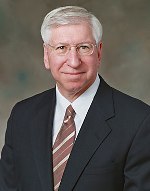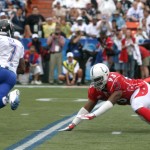Myles Brand and the Illusion of Reform
 Although NCAA president Myles Brand has just passed away, it is not too early to comment on his legacy in the world of big-time college sports. When he was appointed to his position in 2002, those who believed that the NCAA was in need of serious reform were delighted. Brand was then president of the Indiana University and had previously been president of the University of Oregon and provost at Ohio State.
Although NCAA president Myles Brand has just passed away, it is not too early to comment on his legacy in the world of big-time college sports. When he was appointed to his position in 2002, those who believed that the NCAA was in need of serious reform were delighted. Brand was then president of the Indiana University and had previously been president of the University of Oregon and provost at Ohio State.
Not only was Brand the first college president to appointed to head the NCAA, he also possessed impeccable academic credentials. He held a Ph.D. in Philosophy from the University of Rochester, and had previously been a faculty member at the Universities of Pittsburgh, Illinois-Chicago, and Arizona. Although he was a fan of sports, he had never been an athlete or a coach of any consequence. (He played freshman basketball and lacrosse at small college RPI but apparently wasn’t good enough for the varsity.) Moreover, he had proved his ability to stand up to the goliath that is college sports when as president of Indiana University he fired highly successful basketball coach Bobby Knight for repeatedly boorish behavior.
Unfortunately, Brand turned out to be a disappointment for those who hoped that he might usher in an era of real reform in college athletics.
He leaves the NCAA pretty much as he found it, an economic powerhouse characterized by sharp distinctions between rich and poor, with the rich reaping the benefits of ever-increasing television revenue and exploiting the skills of young athletes, only a few of whom are able to continue their careers at the professional level. When he assumed office the schools with the strongest commitments to men’s football and basketball were engaged in a seemingly endless “arms race” characterized by larger and larger stadiums and arenas, and by high profile coaches paid more and more money each year. At the time of his death, the arms race continued unabated.
Media outlets have responded to Brand’s death by emphasizing his commitment to reform. According to the Indianapolis Star, “Brand elevated academics [and] put athletics in perspective.” Sports Business Daily reported he left a “legacy focused on academic reform in the NCAA,” while the Associated Press praised the fact that he “worked to change the perception that wins supersede academics and earned accolades for his efforts.” Kind words, but words that should acknowledge that if these were his goals he largely failed in such efforts.
When one asks what Brand actually accomplished as director of the NCAA, it is difficult to point to any truly significant reform. While it is true that he continued the process of tightening academic standards for athletes and placing greater emphasis on graduation for athletes, it would be disingenuous to claim that during his years at the helm student athletes were held to the same academic standards as ordinary students, for it is clear that they were not.
While there is no consensus among academic reformers as to what NCAA rule changes are necessary, a reform-minded director might have pushed for:
- Salary caps for coaches.
- Requirements that coaches be members of the faculty.
- A return to earlier limitations on the number of regular season games in football and basketball.
- Greater revenue-sharing of broadcast income among all NCAA members regardless of the division in which they participated.
- The repeal of the advantages given to members of the so-called BCS conferences in regard to the determination of the national college football champion.
- Abolition of the distinction between Division I, FBS teams and Division 1, FCS in college football.
- Reductions in the number of athletic grants-in-aid available to NCAA members.
- A new classification system that grouped schools on the basis of their enrollments rather than the size of their athletic budgets.
- Congressional approval of an antitrust exemption for college athletics that would remove doubts regarding the legality of “anti-commercial” regulations.
It is of course true that the president of the NCAA could not unilaterally implement such changes, but there is no evidence that Brand ever committed himself to such innovations. In spite of all of his talk about academic integrity and amateurism, he was basically a supporter of the existing system. While Brand denounced “commercialism gone wild” in one of his final speeches, he was always careful to point out that he was not an opponent of commercialism in college sports. In fact, he regularly encouraged NCAA schools to seek out new forms of revenue. As he frequently put it, college sports could not survive without commercial activity.
In his final remarks at the 2009 NCAA convention (read in his absence by aid Wallace Renfro), Brand warned against the “extremes of unrealistic idealism” as well as the dangers of excessive commercialism.
Myles Brand was a capable president of the NCAA, and he may well have been an improvement over his predecessors, but he was never the visionary reformer that some of his fans made him out to be. We are still waiting for the first “idealistic” president of the NCAA.

 Who knew you could learn so much about jurisprudence from the NFL rulebook? In a
Who knew you could learn so much about jurisprudence from the NFL rulebook? In a 